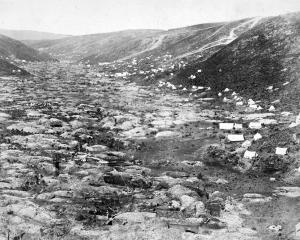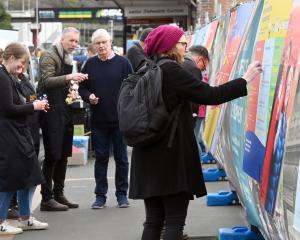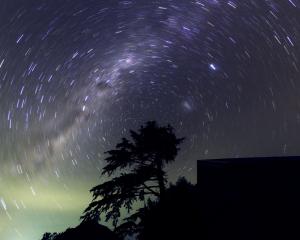
Victorian journalist George Augustus Sala could never have imagined the response when he gathered a close group of friends, writers and actors at the Crown Tavern in London on October 12, 1857.
The group met in the Drury Lane inn with the object of forming a club to provide a forum for entertainment and comradeship.
"A club of merry fellows," Sala suggested. The men were a tongue-in-cheek bunch, who delighted in irreverence.
Rather than name their club after a celebrated poet or writer, such as Shakespeare or Longfellow, the group chose to honour a disreputable poet called Richard Savage.
Savage was a man of dark character who had killed a man in a brawl and spent time at His Majesty's pleasure.
He had died, ignominiously, in a nearby London park a century earlier, in 1743.
The club's motto was: "To provide rational entertainment and good fellowship, to assist any worthwhile cause, whether charitable or private.
To develop and encourage latent talent in any form among its members, be it vocal, musical, acting or any other of the liberal arts".
"The Savage Club was formed to supply the want which Dr Samuel Johnson and his friends experienced when they founded the Literary Club," inaugural president Andrew Halliday declared at the first annual meeting in 1858.
"A little band of authors, journalists and artists felt the need of a place of reunion where, in their hours of leisure, they might gather together and enjoy each other's society."
Qualification for being a Savage was to be a writer, artist, musician, theatrical performer, scientist or lawyer. The club quickly became so popular it had to close its doors to new members.
A new club was formed, called the Orphans, because its members couldn't get into the parent association. The name was also derived from Orpheus, the Greek god of music.
The Orphans Club had similar ideals to the Savages. Discussion of politics and religion was banned and membership was restricted to men.
The clubs believed in music, fellowship, supporting charities and rallying around any member in trouble. The bohemian clubs, as they became known, soon spread throughout the world.
The Dunedin Savage Club was founded in 1893, but went into recess three years later.
The Dunedin Orphans Club was formed on April 20, 1898, at a meeting in the Occidental Rooms, in Manse St.
The club bought a hall, The Little Theatre, in 1946, which burnt down in 1960. A new purpose-built hall was built in Clyde St.
In 1999, the Dunedin Orphans Club changed its name to the Dunedin Entertainers Club. The following year, the hall was sold due to declining membership and it is now a Muslim mosque.
The club is now based in the St Clair Women's Club rooms in Albert St, St Clair.
The Macandrew Bay Orphans Club was established in 1921 but, sadly, it also later lost its records in a 1932 fire. Meetings were held in the Macandrew Bay public hall until April, 1954, when the Orphans Hall was built above the Macandrew Bay park.
The Oamaru Savage Club was formed in 1929 and had up to 200 members for many years. However, membership dipped in the late 1960s and the club relinquished its lease on Peter Pan Hall.
In 1983, the Clubs Koreros was formed at the Armada Inn and continues to host events at the Oamaru RSA.
Otago has played a large part in the history of the Savages and Orphans.
In 1926, Dunedin Orphans Club honorary secretary Clive Evans proposed merging the two clubs and the Association of Kindred Clubs of New Zealand was incorporated. Dunedin member T. W. Dobbie was duly elected the first national president.
While the association survived, and even thrived, during the Depression and World War 2, the advent of television in the 1960s led to a decline in activities.
Female members were finally admitted to the Dunedin club in 1987 as associate members and were granted full membership in 1993. The Dunedin club now has about 123 members, who will be joined this weekend by 220 other Savages and Orphans from 18 clubs around New Zealand for the dominion conference.
The conferences are held biennially, alternating between the North and South Island. The national president is also alternated between the two islands.
The clubs will mark two anniversaries - the 150th anniversary of the foundation of the Savage Club in England in 1857 and the delayed 80th anniversary of the Association of Kindred Clubs of New Zealand in 1926.
The last time a national conference was held in Dunedin was 1972, when it was hosted by the Macandrew Bay club.
Retired Mosgiel watchmaker Bill Borrow (87) has been a member since 1941.
"I joined because of the music, really," he recalled this week. "We all had a basis of music or entertainment or vocal items."
Like many members, Mr Borrow has a strong family connection to the organisation. His father, Les Borrow, conducted the orchestra from 1957 until the late 1970s.
"Time wasn't as important in those days as it seems to be today," he muses. "It's much harder to get young people involved now.
At one time, we had so many members that there was a club rule banning encores," he says.
"It's been a wonderful time - not just the music, but the comradeship. We've always had a fair mix of people, too. We had every sort of profession imaginable."
Mr Borrow played the violin and, like his father, conducted the orchestra for many years.
"Music was an important part of entertainment then. In the silent picture days, before World War 2, the Octagon and Regent theatres both had full orchestras, which played while the picture was played.
"The film was changed on a Wednesday and, after the Wednesday performance, the orchestra would stay back to rehearse for the next week's film."
The association prides itself on being a bit tongue-in-cheek and maintains some fun and zany traditions.
The Dunedin club keeps a stuffed pukeko on the president's table, which was presented after the reading of a poem called The Bokako in 1921.
Nobody remembers the exact reason behind the stuffed bird, but it doesn't really matter. Like many of the group's traditions, it's one of those you-had-to-be-there things.
A group of ex-Royal Navy members, called the Nautical Table, presented a bell to the club in 1932. It sits alongside the stuffed pukeko.
The dominion president wears a Maori cloak and badges are also very popular among members.
Members go on "raids" of other clubs, putting on a concert in exchange for supper and fellowship. The raids maintain the bonds between clubs and are followed, inevitably, by the exchanging of badges between members.
The Wanganui club raided their Macandrew Bay counterparts on Thursday night.
Dunedin engineer Jack Paine (66) joined the Dunedin Orphans Club in 1971.
"There's a lot of history in it for my family. My father was in it and my uncles were in it. At one stage, we had six members of the Paine family in there," he says.
"In those days it was all male though, of course. It didn't change till 1987, when women were allowed to join."
Being a Savage or an Orphan is about "tact, tolerance and talent", Mr Paine says.
"It's for people who would like to perform on stage and show their talents. People who were performers had no critics, so they opened a club where they would have critics. That's how Orphans started, really," he says.
"About the only rules are you're not allowed to discuss religion or politics within the club."
A typical night features the singing of the New Zealand national anthem and the opening ode, followed by sketches, songs, stories, supper and a chat. Anyone over 18 is welcome to attend.
The Association of Kindred Clubs of New Zealand dominion conference started at the Kings and Queens Performing Arts Centre yesterday and finishes tomorrow.













